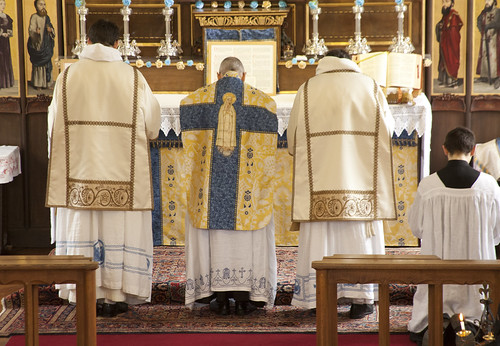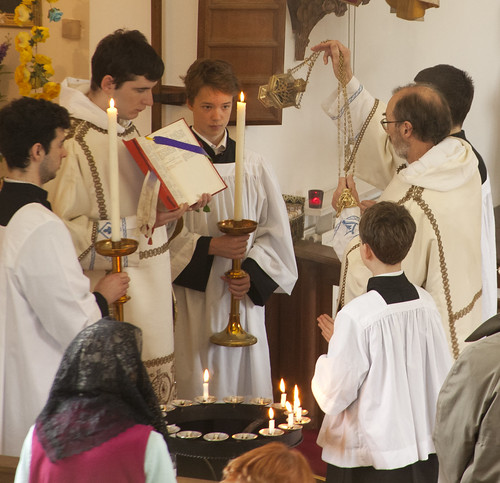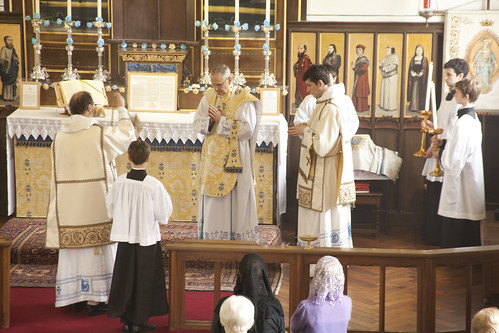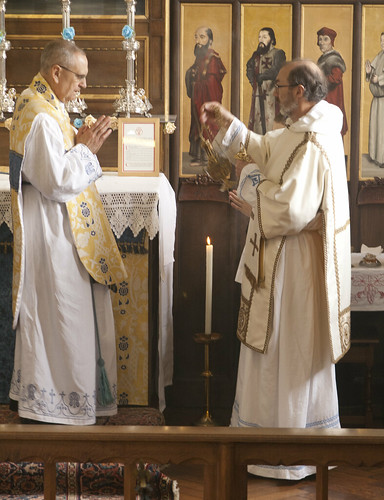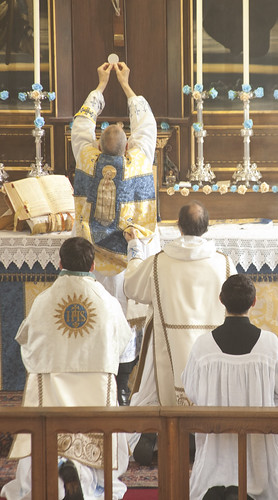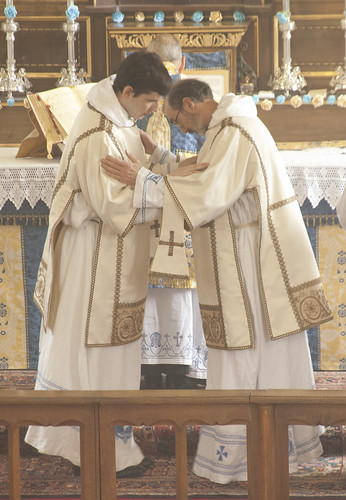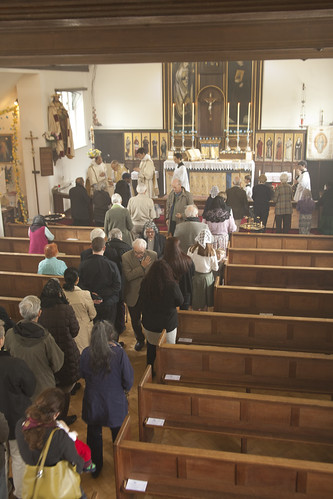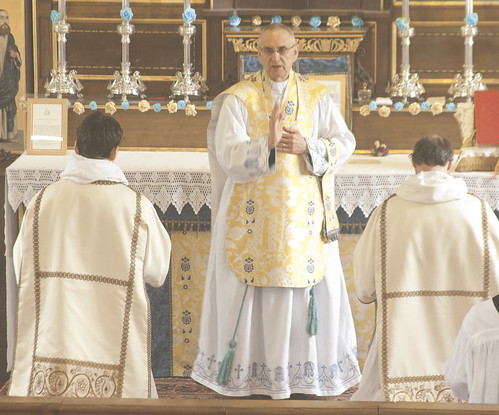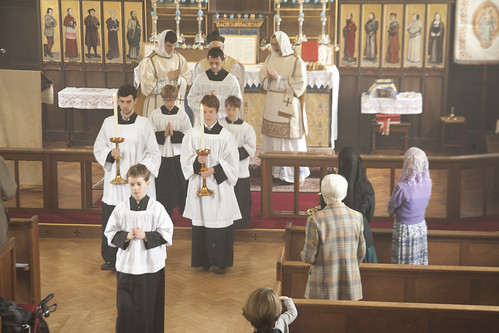Chairman's Blog
Who are Pope Francis' 'rigid Catholics'?
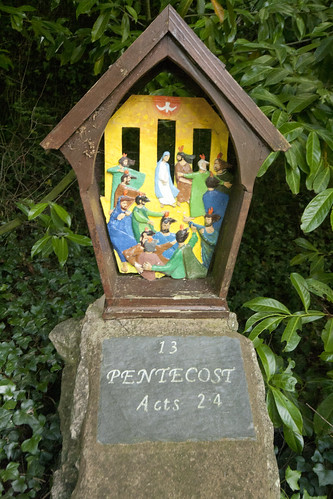 |
| Crush not the spirit. From the Rosary Walk at Pantasaph, the Franciscan Retreat Centre in North Wales. |
“Communion is essential,” Francis said. “Sometimes it can be better to renounce living in every detail what your own path demands, in order to guarantee unity among the brothers who form the one ecclesial community, of which you must always feel yourself a part,” he said.
Translation: If local pastors or the bishop asks you to join everybody else for Mass on Sunday, do it. If the Vatican tells you to play by the liturgical rulebook, do that too.
Second, Francis urged the Neocatechumenate to respect the local cultures in which the group wants to put down roots.
Learning foreign languages is helpful, the pope said, but “much more important will be your commitment to learning the cultures that you meet, recognizing that the need for the Gospel is everywhere, but also [recognizing] the work of the Holy Spirit in the life and the history of every people.”
Translation: Don’t ride into places such as Japan, or Nepal, and insist that in addition to becoming Catholic, everybody also has to become Spanish or Italian.
Third, the pope asked the Neocatechumenate to foster internal freedom and to respect those who decide to leave the group.
“Everyone’s freedom must not be coerced,” he said, “and the eventual choice of anyone who decides to seek other forms of Christian life … outside the [Neocatechumenate] must be respected.”
Translation: Lighten up internally, and when somebody leaves, don’t swing into action like a K Street lobbying firm specializing in character assassination.
It hurts the heart when, before a church, before a humanity with so many wounds, moral wounds, existential wounds, wounds of war, which we all hear of every day, to see that Christians begin to do philosophical, theological, spiritual “byzantinism”, rather what is needed is a spirituality of going-out. Go out with this spirituality: do not remain securely locked inside. This is not good. This is “byzantinism”! Today we have no right to byzantinistic reflection. We must go out! Because — I have said this many times — the Church seems like a field hospital. And when one goes to a field hospital, the first task is to heal the wounded, not to measure cholesterol... this will come later.... Is this clear?
After 60 years, the original charism has not lost its youthfulness and vitality. However, remember that the centre is not the charism, the centre is one alone, it is Jesus, Jesus Christ! When I place at the centre my spiritual method, my spiritual journey, my way of fulfilling it, I go off the itinerary. All spirituality, all charisms in the Church must be “decentralized”: at the centre there is only the Lord! For this reason, in the First Letter to the Corinthians, when Paul speaks of charisms, of this most beautiful reality of the Church, of the Mystical Body, he ends by speaking of love, of that which comes from God, which is truly God’s, and which allows us to imitate Him. Never forget this, to be decentralized!
Thus the charism is not preserved in a bottle of distilled water! Faithfulness to the charism does not mean “to petrify it” — the devil is the one who “petrifies”, do not forget! Faithfulness to the charism does not mean to write it on a parchment and frame it. The reference to the legacy that Don Giussani left you cannot be reduced to a museum of records, of decisions taken, of the rules of conduct. It certainly entails faithfulness to tradition, but faithfulness to tradition, Mahler said, “is not to worship the ashes but to pass on the flame”. Don Giussani would never forgive you if you lost the liberty and transformed yourselves into museum guides or worshippers of ashes. Pass on the flame of the memory of that first encounter and be free!
Like this, centred in Christ and in the Gospel, you can be the arms, hands, feet, mind and heart of a Church “which goes forth”. The way of the Church is to leave her walls behind and go in search of those who are distant, on the peripheries, to serve Jesus in every person who is marginalized, abandoned, without faith, disappointed by the Church, a prisoner of one’s own selfishness.
“To go forth” also means to reject self-referentiality, in all its forms. It means knowing how to listen to those who are not like us, learning from everyone, with sincere humility. When we are slaves to self-referentiality we end up cultivating a “labelled spirituality”: “I’m ACL”. This is the label. Then we fall into the thousands of traps offered to us by the pleasure of self-referentiality; by that looking at ourselves in the mirror which leads us to confusion and transforms us into mere impresarios in an NGO.
Support the work of the LMS by becoming an 'Anniversary Supporter'.
Ann Furedi in Oxford

The Birmingham March for Life is on Saturday: see the full details of the day's event here. The march itself is from 2pm but the day starts with Masses and talks from 9am. It's huge and important; please go if you can.
I'm reposting below my comments from November 2013 on Ann Furedi's talk in support of abortion which took place in Oxford.
--------------------------------------------
Last night I attended a debate organised by Oxford Students for Life. They invited Ann Furedi, head of the country's biggest abortion provider, BPAS; she was opposed by Sarah de Nordwall. I was very impressed, with my experience of abortion debates in the Oxford Union, at the good natured and rational quality of the discussions; this is a great credit to the organisers and their supporters (pro-abortion students were also present, in smaller numbers). It was a nice demonstration, in fact, that the hysteria in the abortion debate does not, in the main, come from pro-lifers, despite the strength of feeling on their side of the debate.
I was impressed by Sarah de Nordwall, particularly in the way she handled hostile questions. This blog post, however, which I promised Sarah I would write, is about what Ann Furedi had to say.
Furedi was witty and articulate. She made a number of very interesting concessions at an early stage which helpfully closed off a number of dead-ends for the discussion. She reminded us, for example, that there is no legal right to abortion in English law. Something else very interesting which she said is that until 1990 there was no time-limit on abortions in Scotland, but there were no more late-term abortions there than in England before then. Her point was that women don't want late-term abortions. Pro-lifers may need to consider the efficacy of time-limit legislation as a means to reduce abortion numbers.
| Sarah de Nordwall surrounded by Dominicans |
Furedi's argument for a moral right to abortion turned on two ideas. The first was that moral personhood is assocatiated with functional attributes, such as self-consciousness. As the debate went on she seemed to back away from this idea somewhat; she didn't want to draw the conclusion, for example, that infanticide was permissible. So her argument came to rely exclusively on the second idea, which is that for a pregnant woman a moral right to abortion followed from her right to 'bodily integrity'. Actually I think 'bodily self-determination' might be a better term for her intuition here. What happens inside a body, in effect, should be up the owner of the body.
I felt that this argument should have come under more pressure in the debate, and I offer here some objections to it.
1. The argument appears to generate the conclusions Furedi wants only if the distinct existence and bodily integrity of the fetus is ignored. Given that the fetus has his own body, that brings something else into the equation which needs to be taken into consideration. What right has a women to interfere with another person's body? Furedi appears to think 'none' if the woman is a pro-life activist taking an interest in the fate of a woman considering an abortion (a point she made a number of times), but if the woman is a pregnant mother it appears to be quite different in relation to her unborn child. The first point noted above was designed I suppose to deal with this, but as Furedi conceded it cannot bear the argumentative weight: just because a human can't talk doesn't take away a moral status he would otherwise have. This being so, Furedi's argument seems to defeat itself: if we have the right to bodily self-determination, then the fetus' right would prevent the mother from aborting.
The responses Furedi made to this kind of point consisted of insisting on the lesser moral status of the fetus. Although she wasn't able to make a principled argument for this, she seemed to think it was sufficiently obvious, even while conceding that a fetus has value - more, as she put it, than a goldfish or a cat. But given that the fetus' life is at stake, and the mother's is not, to say that the fetus weighs less in the scales of value is not enough. I might be obliged to suffer a lot of inconvenience to save the life of, say, a whale, a colony of rare bats, or, come to that, to ensure the continued existence of an historic building.
 |
| Ann Furedi |
2. The principle of radical bodily self-determination, which Furedi needs, is not plausible, and is not applied in law or in common-sense moral thinking. Examples which show this are suicide and body-integrity disorder. No one has the moral right to commit suicide, which is why we all think that it is permissible for bystanders to save a would-be suicide from (say) drowning, or talk him off the window ledge. (The Samaritans even abandon their normal 'non-directive' counselling for prospective suicides.) Those suffering from body-integrity disorder, who want healthy limbs amputated, do not have the right to undergo the amputations, indeed it would be wrong for a doctor to carry out their wishes. These cases do not even involve the agents directly harming other parties, so a fortiori it cannot be concluded from our intuition that people are 'in charge of their own bodies', that a mother can harm a fetus enclosed inside her body. Yes, we say casually that we can do what we like with our bodies, but the principle here is a weak one. It may include body-piercing, but it doesn't even extend to experimenting with hard drugs, let alone anything more dramatic or irreversible.
A wider point is about people being (morally) the best judges of their own interests. The statute books are bursting with laws to prevent people making stupid decisions on the basis of what they imagine are their best interests. Everything from building regulations to tobacco duty acknowledges that the law has a role in guiding rational, grown-up and autonomous decision-makers away from bad decisions.
3. Furedi conceded that some women think of abortion in a moment of confusion and panic, and being better-informed or just a bit calmer they may well change their minds. She also conceded that many women are under intense social pressure to abort baby girls. She appealed to the case of the women who are cool, calm, and collected, and decide rationally to go through with it as being in their best interests. I would have liked to have asked, in light of this, whether making abortion easier, legally or practically, is in the best interests of women overall. It certainly isn't in the interests of the first kinds of cases, who are more likely to do something they later regret, and are easier for others to bully, the easier abortion is to arrange. Even supposing the cool, calm ones are right about their interests (see point two), it is far from clear that this means that a situation should be perpetuated in which many, many others end up being violated in the most horrible way, when they cave in to pressure to have an abortion which they do not want.
Again, compare the case with drugs. Drug users constantly tell us that, in the immortal phrase, 'they can handle it'. Suppose they can - suppose it is true that a certain proportion of users can genuinely derive pleasure from hard drugs without it destroying their lives. As an argument for de-criminalisation this is extremely weak, because everyone can see the drugs users who clearly can't handle it, and making drugs more widely available will cause terrible harm to people in that category.
These parallels are not exact. It is for the pro-abortion advocates to explain, however, what is the principled basis of a moral right to abortion, and why such principles don't lead to counter-intuitive results when applied to other cases.
Votive Mass for Fatima: photos
Here are some photos of the Votive Mass of the Immaculate Heart which was celebrated in SS Gregory and Augustine by Fr John Saward, last Saturday: 13th May.
Support the work of the LMS by becoming an 'Anniversary Supporter'.
'What does Fatima mean?' by Hamish Fraster
 |
| Hamish Fraser with a dove on his head: one released during a Fatima conference in Paris. |
I'm not an expert on Fatima, but I thought that this excerpt from Hamish Fraser's book Fatal Star serves a useful contrast, and perhaps corrective, to certain conventional views of 'the message of Fatima'. The blog title is taken from a section heading in the book, p145, and the passage below follows it.
It is true that Our Lady of of Fatima did ask for prayer: for the Daily Rosary, the First Saturday devotion, and for the wearing of the brown scapular. Nevertheless, these are purely incidental to the essence of the Fatima message. This was made clear to John Haffert ... of the international Fatima apostolate...
When Haffert asked Sister Lucia whether the principle [sic] request of her heavenly visitor was for the Rosary, Sister Lucy's answer was most emphatically in the negative. Moreover, he affirms that her reply was given with a quite "surprising assurance" [from Haffert Russia will be Converted]. And Haffert, who is far too honest not to admit it, tells us that until then he had always assumed that the Rosary to be Our Lady's principal request.
When he asked what was her principal request, the reply came with no less assurance: "Penance".
Nor did the penance requested imply any spectacular recourse to fasting, flagellation or the wearing of hair shirts. According to Sister Lucia, Our Lady made it perfectly clear that all she was asking for was "the faithful accomplishment of our daily duties". And she proceeded to explain that Our Lady had requested the Daily Rosary, the First Saturday devotions and the wearing of the brown scapular, in order that the Faithful might have the spiritual fortitude necessary to the leading of truly Christian lives.
In other words, Fatima is the complete answer to the spurious piety of the gunman with a prayer on his lips.
As a former active and senior member of the Communist Party, both in the Spanish Civil War and in industrial Glasgow, Fraser was particularly interested in the connection with the conversion of Russia. He goes on to argue that, quite aside from any spectacular supernatural intervention, Russia's conversion would be inevitable if the Church's social teaching was manifested in the daily lives (including the work lives) of Catholics around the world.
P149
In light of this recognition, the Catholic business man would not confine himself to making generous donations to the Church; in the market place no less than in the sacristy he would make it abundantly clear that to all and sundry that business need not always mean mere business. As an employer of labour, he would, like the Harmels and Alan Turner, provide a living example of the meaning of the great social encyclicals.
The Catholic worker would be similarly distinguished from the herd of the class-conscious. An ardent defender of justice for his fellow-workers and a conscientious member of his trade union, he would seek to give to the latter that Christian idealism which in the nineteenth century so distinguished the British trade unions from their anti-religious counterparts on the Continent. Insisting on the dignity of labour, he would insist no less on the humanity of the employer, and would refuse to be stampeded by the prevalent assumption that the doctrine of original sin is applicable only to owners of capital. ...
If, therefore, only the Catholic business men and the Catholic workers in our hypothetical parish were thus won over to realise that meaning of Christ's Kingship as it affected their daily lives, the mission of the Church would become visible for the first time in the modern world to the non-Catholic section of the population no less than to the Faithful themselves.
Fatal Star was first published in 1954. While I agree entirely with Fraser's point about the lost opportunity of the pre-conciliar era in the implementation (or even effective promulgation) of the Church's social teaching, compared with today the Faith was remarkably clearly manifested in the daily lives of Catholics at that time, and this was indeed why the Church enjoyed, again compared with today, such buoyant rates of conversion. It was manifested in practices like Friday abstinence, the stoic response of Catholics to prejudice and discrimination, the reluctance of Catholics to marry outside the Faith (which was connected with the large number of 'marriage converts'), and increasingly counter-cultural Catholic attitudes to divorce, abortion, euthanasia, contraception, and family size. Fraser could have no idea how bad things were about to become.
Not many Catholics today could hope to take a significant practical hand in influencing their work-places in light of Catholic social teaching, but the general point is more important than ever. Living our lives in a truly Catholic way means allowing the Faith to make a difference to what we actually do, and the difference it makes will be a stark one in many areas of life. We certainly can't respond to the message of Fatima if we are not doing this much.
Support the work of the LMS by becoming an 'Anniversary Supporter'.
Why I'm not going to lambast Traditional Catholics
 |
| Self-cricism. They were executed anyway. |
I've been taken to task for defending Catholics attached to the Traditional Mass from various exagerated criticisms, and for pointing out that other identifiable groups in the Church have the same characteristics, if not worse ones, rather than engaging in Maoist-style self-criticism. Today I'm going to say a bit more about this.
We are all sinners, and if anyone reading this has a story about a sinful Traditional Catholic, I'm not going to claim that such a thing could not be true. There are a number of dangers, however, with Maoist self-criticism, which really should be obvious.
1. It is narcissistic and inward-looking. Frankly, the personal qualities of Traditional Catholics are not very important for the Church as a whole. Let's just get over ourselves, shall we?
2. It implies the truth of generalisations about Traditional Catholics, which is itself uncharitable. For me to say 'I've heard these criticisms and there is truth in them - yes, [taking out an onion] I'm a Traditional Catholic, and I'm a bitter, hate-filled, Pharisee' implies something not just about me personally but about the group as a whole: it is an accusation against my fellow trads, and one I have no right to make.
3. Public self-criticism implies moral superiority. Only the morally superior are so humble as to accept snarky criticisms as the Voice of Conscience. To do this publicly is to declare one's superiority publicly. The paradox is acute because we are being accused, among other things, of thinking ourselves superior. If there is an ounce of sincerity or compassion or indeed common-sense in our accusers, the reaction they will seek from us will not be a public proclamation of humility.
4. It suggests a degree of uniformity among trads which is completely false. Traditional Catholics (thank heavens) are not members of a cult. We haven't all been through some kind of training, we have no means of enforcing 'message discipline', and some of the people in a typical EF congregation will only recently have started going - others may be trying it out for the first time. We have nothing in common with each other in terms of education, life experience, social class, or ethnic background. This may be a shock to some people who have come to expect every movement in the Church, and every 'type of Mass' (Family Mass, Student Mass, Polish Mass etc. etc.) to be colonised by a 'type of Catholic'. We are not a 'type of Catholic': we are simply Catholics who love the Traditional Mass. That brings with it an interest in traditional spirituality, traditional devotions, and, in general, orthodoxy. But we have very different personalities and life experiences: to suggest we are all, for example, pessimistic, or afflicted by pride, or that we have specific tastes, is to engage in a very unhelpful fantasy. I'm certainly not going to engage in that fantasy myself.
5. To promote a Public Relations programme for Traditional Catholics to make the movement more attractive would, if possible (which it is not), turn the movement into something fake. 'Watch out, everyone! there's a non-trad coming, big smiles everyone, no-one mention sin or penance, no-one talk about Pope Francis! We'll be able to relax when he's gone...' Is that the kind of movement we want to be? That is what cults do. I've heard it said that this is what some movements in the Church do. If that is true, that is a terrible thing. By all means be polite and tactful, but don't be fake. We should be at home in the Church. We should be at our ease when chatting with our fellow Catholics.
6. To engage in specific apostolates as a PR exercise is to instrumentalise the suffering and needs of others. It has been suggested that Traditional Catholics do more 'for the poor' in obvious and eye-catching ways to counter the accusastion that we are less interested in social justice than we should be. This is an unworthy suggestion. Traditional Catholics, like everyone else, look about them to see what needs of our fellow creatures are most urgent and what we have the resources and skills to address. Trads are very heavily involved in the pro-life movement and in education, and (obviously) in supporting the Church's liturgy in all sorts of ways. To suggest this are the wrong things to focus on for public relations reasons is an insult not just to the good people who spend their time and money so freely for their fellow men in these particular ways: it is an insult to the people who would benefit from the more PR-friendly work. They are being treated like extras in a publicity stunt.
7. Public self-criticism gives credence to accusations which in many cases are projection (people accuse us of what they fear about themselves), and in other cases are actually criticisms of the tradition itself. Shall I tell you why certain liberal Catholics think that trads are 'judgmental', for example? Because, first, they are themselves judgmental, casting anyone with whom they disagree into outer darkness. And second, because they think the traditional Mass, and associated devotions and spirituality, is judgmental. After all, they might say, since the EF, with its references to sin, is horrible and judgmental, surely the only people who like it will themsevles be horrible and judgmental. In this situation, to say 'yes, maybe we are a bit horrible and judgmental' is the worst possible response. It may sound arrogant to some for us to reject such accusations, but what is needed here is for people to say: actually, you don't need to be like that to like the Traditional Mass, because the Traditional Mass is not itself like that.
To conclude, insofar as I can be said to have a position of leadership or influence in the Traditional movement, is absolutely not my role to act as some kind of morality policeman. Further to point 3, criticising one's fellow traddies (for being judgmental and superior etc.) is precisely to engage in the behaviour (being judgmental and superior) which is being criticised in the first place. The idea that the movement should have a clique of scribes and pharisees going around keeping everyone else up to the mark is so utterly insane, as a response to the kings of criticisms to which we have been subjected, that I can only appeal to the common sense of those involved in this debate to see the problem. Come on, have a laugh: it's just silly, isn't it?
Support the work of the LMS by becoming an 'Anniversary Supporter'.
Donna Steichen on the New Age in the Catholic Church
Scholars who pruned the supernatural from scriptural interpretation on the grounds that 'modern man' could not believe it give no sign of having second thoughts as modern men and women flood into fundamentalist churches or pay thousands of dollars to seek advice from New Age mediums.
P19
Nuns who in the early 1960s had warned students not to view the sacraments as 'magical', came to embrace occult practices, implicitly if not explicitly demonic. Out of the human instinct to express faith through physical gestures, many of those who ceased to kneel for prayer began to substitute yoga postures, T'ai Chi, 'New Age' spiritualism or circular dances, widdershins, around a smoking cauldron. ... Some who denied the existence of angels found New Age 'channelling' and 'spirit guides' credible.
P22-3
Some of the New Age stuff would seem relatively harmless if it were happening outside the Church. Inside, of course, it powered a persistent attack on the Faith of ordinary Catholics, who were bewildered to find New Age spirituality replacing Catholic spirituality in sermons, retreat centres, and supposedly Catholic literature. The Neo-Pagan and Occult aspects, however, were far from harmless. Steichen witnessed serious attempts as witchcraft and goddess-worship in conferences attended to overwhelmingly by current or former female religious. She quotes a former witch:
When I was a witch, I performed rituals. I evoked spirits. I called entities. I cast spells, burned candles, concocted brews. The only thing I didn't do was fly on a broom, but I probably would have figured it if given time. But where did it lead to? Into darkness, depression and the creation of an aura of gloom around me. I was frequently under demon attack. The house where I lived was alive with poltergeist activity ... due to residual 'guests' from rituals. My friends and family were afraid of me. I knew I had no future; all I had was a dark present. I was locked in by oaths and by 'destiny'. But I had power, something I'd always wanted. It wasn't Satan's fault. He didn't exist--or so I thought. I gave it all up, and came to Jesus on my knees. ... He freed me from the oppression and gave me back my soul--the one I had so foolishly given to evil in exchange for power. .. Our salvation was bought at a great price and all we have to do is reach out for it. But we cannot serve two masters.
Carmen Helen Guerra, 'The Practice of Witchcraft', letter to the editor, National Catholic Register May 18th 1986. Quoted in 'Ungodly Rage' pp70-1.
By the end of the 1980s, attendees at quasi-Catholic 'goddess' get-togethers were clearly ageing. The exodus of female religious from the Faith, and mostly from their communities, had created a market for this stuff which wasn't going to be renewed with future generations. They tried desperately, of course, to influence ordinary lay Catholics, old and young, but insofar as their work was effective it overwhelmingly led to lapsation rather than more recruits for their internal revolution. In the meantime conservative lay groups, and the appointment of at least a smattering of conservative bishops, started to put a brake on the attempts to drag Catholic institutions into the Neo-Pagan fold.
We can look back and see what has happened since then. Ageing religious sisters, and former religious sisters, can still be found making life difficult for orthodox Catholics (and particularly for priests) in parishes, chaplaincies, retreat centres and so on. The more straightforward kind of modernism continues to destroy historic Catholic institutions, which after a generation of being not-very-Catholic are often closed down for lack of custom or officially secularised. Conservative and Traditional alternative religious communities and institutions have begun to put down roots.
Are these drawn to idolatry--to false goddesses and false prophets--seeking satisfactions largely lost to post-conciliar iconoclasm and the sterile feminist mores of American life? Do they hunger for the sacred, for the richly symbolic drama of color, meaning and mystery that has been leached out of contemporary liturgy, for the interior life so seldom mentioned in the prosaic, culturally adapted Catholicism now prevailing, for a compelling sense of ultimate purpose? The false mysticism of neo-gnostic feminism offers an illusion of these.
p118
Are traditionalists paranoid?
Over on Unam Sanctam blog, the old canard of the 'obnoxious trad' is wheeled out. Apparently the author has met a couple of priests don't like the people who come to the Traditional Mass; one has stopped celebrating it. Hmm. Maybe these Catholics were sinners, in need of the sacraments. It seems they won't be receiving them with much good will from these priests.
It has been well answered by Brian Williams at the Liturgy Guy here. Catholics attached to the ancient liturgy are accused of 'chasing' the traditional Mass from parish to parish, and not coming to other parish events. Williams points out that this is simply a consequence of the fact that they are not having their legitimate aspirations for the sacraments in the traditional forms met in any one parish, and very often have to travel long distances to attend services and events. A priest who declines to go beyond what he describes as a 'semi-regular' provision of the EF can hardly complain about that. I don't necessarily blame the priests for not doing more: I don't know what their other committments are. But by the same token no one is in a position to criticise laity for not making multiple two-hour round trips each week for extra events at a parish which has not given them a liturgical home.
Another aspect of such complaints is the claim that Traditional Catholics are over-critical or polemical. What strikes me is the double standards this exhibits. Every parish priest has a store of tales to tell about difficult Novus Ordo Catholics. They don't usually have the luxury of closing down this or that Mass, abolishing the Liturgy Committee, and throwing out the Flower Arranging Rota, because the people involved would raise a stink. The limited number of Catholics in most places attending the Traditional Mass, and the lack of fellow-feeling from Catholics in the same parish attending other Masses, not to mention the attitude of local clergy and the bishop, make them an easy target by comparison.
It would be impossible to establish empirically who are the most annoying, at the parish level, but are the kind of Traditional Catholics who attend diocesan Latin Masses really more aggressive and downright rude than their critics, at the level of public debate? This is what the post below was about, back in July 2013. Some of the voices carping about traddies noted in it have fallen silent since then; others have not.
---------------------------
Are traditionalists paranoid?
If so, our paranoia is justified.
First off are the letters pages in the Catholic press. Letter writers can act as the attack dogs of a newspaper since while editors have complete freedom to choose what to publish, they can still disclaim responsibility for it. When we find obsessives attacking trads what seems like every week, this tells you a lot about what is deemed acceptable. There is the busy Martin Elsworth, mainly in The Universe (traditionalists are 'cafeteria Catholics' for preferring the EF) and Tom MacIntyre in the Catholic Herald ('The Old Rite's individualist allure has intensified with postmodern vogues for the antique, the "retro" and the exotic in religion.'), who rejoiced in 47 letters published in just 44 months.
But what of feature articles? These are the real meat of the press.
Well, there is Dr John Casey, in the pages of The Tablet, called us 'dissidents', 'rubricists', 'ideologues' and 'misogynists'.
Nice. But Casey has got all liberal in his old age, hasn't he? Isn't that kind of vituperation to be expected?
Maybe, but we we also were edified by George Weigel characterising us in terms of 'Maniples, lace albs and Latin liturgies', and John Haldane as 'nostalgic and slavish', in the same paper
That was the The Tablet, right? That would never happen in a conservative paper, would it?
Perhaps not - until, in The Catholic Herald, Stuart Reid told us to 'abandon the Church and join the SSPX', and that we are 'not on [Pope] Benedict's team'. Not a loopy letter-writer, you understand, a man with a prestigious regular column.
I need hardly add the things which Mgr Basil Loftus lobs at us in The Catholic Times.
Ok, so that's journalism, it's tomorrow's fish-wrap. You'd never get that kind of attitude in a more permanent publication, from a respectable publisher like the Catholic Truth Society?
No - not until Dr Raymond Edwards said in one that we were characterised by a 'defensive "ghetto" mentality', and a 'fondness for dressing up', and are connected with 'hard right' and anti-semitic politics'. This is a booklet still in print.
Right, but that's just a little booklet, isn't it? I mean you wouldn't hear a proper academic dishing out silly and insulting comments about trads, would you?
Ok, so perhaps you would.
 |
| Audience at the LMS One Day Conference last year: nutters, every one of them. |
Some of the above writers have criticised liberals alongside trads, and others lump trads and conservatives together for abuse: we get it from both directions. But it goes beyond that. In terms of intensity, frequency, and the prestige of the writer and the forum, it is open season on traditionalists in a way it never is on other groups in the Church. The Tablet has never published such an extraordinary screed, like Dr Casey wrote about us, about conservatives; nor has the Catholic Herald printed anything remotely as embittered and personal attacking liberals, as the stuff provided by Stuart Reid about trads. The same is true of the letters pages, the CTS, and academics addressing conferences. It's just not done, old boy.
While this state of affairs continues, please don't accuse us of paranoia.
Rigid Young People and the Traditional Mass
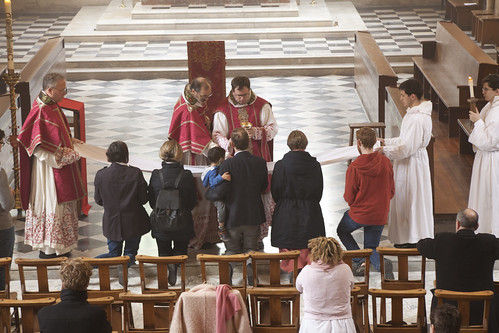 |
| 'Feed my sheep.' |
Once again the Pope has criticised 'rigid young people'. The Church is a big place and I'm sure his criticisms apply to some people. The issue of hypocritical rigid Catholics is a big theme in The Devil Hates Latin, and it may well be that Pope Francis has the kind of people in view there in mind, at least among others. The difficulty is how the tone comes over for a lot of the Catholics in the West who are actually going to read some summary of these remarks. It can easily sound as though the Pope is criticising people who take their Faith seriously, or would like to.
I thought I'd repost a section of an old, over-long post from this blog on young people and the Traditional Mass: this is below, and the post is here.
One point I'd want to stress here is when young Catholics turn up in University Chaplaincies, on Lourdes Pilgrimages, or at various organised events, the organisers have the chance, often taken, to experiment a bit. It might be charismatic-style liturgies, Taize chant, caring-sharing prayer groups, Exposition and adoration, Bible study, or any of a number of things. Some of these things will appeal to some young people and, if the Blessed Sacrament is not profaned and if the Faith is not denied, well, good for them, though there are sometimes dangers involved as well. My point is that these things are not simply the liturgy and the sacraments: they are something added to the liturgy and the sacraments, because the liturgy and the sacraments are felt to be insufficient. Insuffiently thrilling, perhaps.
When a group of young Catholics is offered something Traditional, say on an LMS Pilgrimage or the St Catherine's Trust Summer School and Retreat, or events organised by one of the Traditional Priestly Institutes, what they get is, centrally, the liturgy and the sacraments. We don't exclude all para-liturgical devotions, obviously, but the high point of what happens is the liturgy and the sacraments. Not for nothing are we the movement for the promotion of the Traditional Mass. It isn't something we've invented or adapted or composed. It is something given to us by the Church. The words of the Mass, and maybe parts of the Office, and of traditional devotions like the Rosary and Benediction, which are on offer at these events are not ours, they are the Church's words. The sacraments of the Eucharist and of Confession have power, not from our cleverness, but from Christ. If the Catholic Church has anything to offer, she offers it through the liturgy and the sacraments. We are not going to go wrong in offering people these things, using the forms and the language used by the Church for many centuries.
Those who would like encourage pastors with the care of young people to offer them every exotic fruit of experimentation, inspiration, or even syncretism, but not the Traditional Mass, I wish they would stop and think about what they are doing. They would say that the Traditional Mass takes people away from the mainstream Church. But why aren't they offering people what the Church offers them?
---------------
Reposted, in part, from Sept 2014.
The question, to repeat, is not what the young people are explicitly asking for, since they don't, usually, know what the options are. The question is what they make of what they are offered. Some will like the evangelically, charismatically, groove, though I do wonder what happens to them when they feel they are getting a bit old for it. This problem isn't limited to the Catholic experience: if Holy Trinity Brompton is full of under-30s, and has been for 30 years, what's happens to them when they reach 30? At least a proportion of them lapse with a life-long inoculation again Christianity, which they regard as juvenile, anti-intellectual, and embarrassing, a phase in their lives they'd rather not talk about.
Do young people respond to the Traditional Mass and traditional devotions? A good number of them do. These are available in such a limited number of places that it is impossible to make a scientific appraisal, but for many young people the experience of the Traditional liturgy is a life-changing revelation. They may grow out of it, a few certainly move on, but what we don't need to worry about is it being a fad fuelled by dubious religious emotion. It appeals to the heart, through the music and ceremonies, it appeals to the intellect, through the texts and the theology, but above all it is all about the public prayer of the Church and the Sacraments.
My experience of talking to the young people who came to our Mass in the Slipper Chapel at Walsingham, a young lady and a man, who said that it was a huge relief after the Youth 2000 experience, mirrors conversations I have had with masses of young people, and their pastors, over the years. To repeat the obvious, very few Catholics under 40 have even heard of the Traditional Mass: it is a completely closed book to them. For many, nevertheless, when they stumble across it, it is exactly what they have been looking for. For others, it answers questions, historical and spiritual, they have been asking for a long time. Others find in it, after a bit of getting used to it, an approach to spirituality which is uniquely satisfying. Such, of course, was my own personal experience as well.
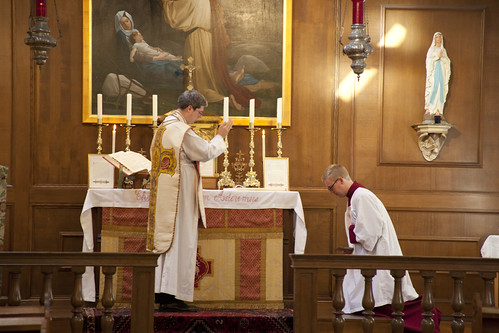 |
| One of two EF Low Masses celebrated at the Evangelium Conference last time I was there. Each morning. |
I'm glad to say that the Traditional Mass is beginning to creep in as an option in some of the settings where young Catholics are to be found in numbers. You will find it at meetings of the Faith Movement, at the Evangelium Conference, at the forthcoming SPUC conference, and in a growing number of University chaplaincies. It is still a bit marginal, usually, the early morning 'quiet Mass' option, but it is a start. Let's not forget what Pope Benedict XVI said of it:
... it has clearly been demonstrated that young persons too have discovered this liturgical form, felt its attraction and found in it a form of encounter with the Mystery of the Most Holy Eucharist, particularly suited to them.
Support the work of the LMS by becoming an 'Anniversary Supporter'.
Masses in Limerick: Letter in The Tablet
 |
| Not available in Limerick? |
Last weekend The Tablet reported on the alleged fact that the previous Tuesday had not seen any public celebrations of Mass in the Diocese of Limerick. The headline connected this with a shortage of priests, but the text of the story took a quite different line, pointing out that the diocese has no fewer than 108 priests. Surely one or two could have said a public Mass? The reason they didn't is that they were all involved in a training day. So there were lay-led eucharistic liturgies instead.
According to Catherine Kelly, general manager of Limerick Diocese, the liturgies are one of the many initiatives from last year’s synod. The diocese is offering people opportunities to have “greater involvement in the Church, greater leadership [and] greater ownership”, she said.
“The Church we all grew up with could be viewed as a train,” said Bishop Leahy, “a locomotive pulling many carriages behind it. That is not fit for purpose today. We all need to be engines of the Church, out there, working for others, doing good work”.
An interesting attitude. What the Protestants couldn't do, the liberals have done. Anyway, this weekend The Tablet have published a letter of mine:
Your report on the Mass-less Tuesday in the Diocese of Limerick gives the impression that it was not just an unfortunate coincidence, but a deliberate stunt to promote lay-led Eucharistic liturgies. Let us hope that the bishop of Limerick does not see his role as depriving his people of the sacraments, instead of feeding his flock, which would indeed be strange if true.
In any case, the report was false. The church of the Sacred Heart in Limerick, sold to developers by the Jesuits in 2006 and re-opened for worship by the Institute of Christ the King Sovereign Priest in 2012, had Mass at 8am and at 7pm, and also times for Adoration and Confession. No doubt it didn't appear on the radar of the diocesan employee quoted in the story because, although the Institute works in the diocese with the permission of the bishop, they celebrate Mass in the Extraordinary Form.
Yours sincerely,
Joseph Shaw
Chairman, The Latin Mass Society
Support the work of the LMS by becoming an 'Anniversary Supporter'.
Bullying and ostracism from the Catholic Education Service
 Copies of a guidance document entitled 'Made in God's Image', on homophobic bullying, from the Catholic Education Service are doing the rounds. It is going to be sent to Catholic schools soon but Mark Lambert has put the pdf on DropBox and made a few comments.
Copies of a guidance document entitled 'Made in God's Image', on homophobic bullying, from the Catholic Education Service are doing the rounds. It is going to be sent to Catholic schools soon but Mark Lambert has put the pdf on DropBox and made a few comments.
The document has both superficial and deep problems. Superficially, I'm suspicious of documents which don't include the names of the people who drew them up, or indeed the name of anyone willing to take responsibility for it. This document has the logos of the CES, St Mary's University, and the Aquinas Centre for Theological Literacy on it. Is it actually endorsed by these institutions? (Did St Mary's ask its governing body to vote on it? I hardly think so.) Where does it come from? Who paid for it? Who composed it? No matter, the CES is promoting it, maybe that is all we need to know.
Again, this is a 37-page document on homophobic bullying, which sets out lesson plans for eight 50-minute lessons to be devoted exclusively to this topic. What about other forms of bullying? What about other forms of bullying which target 'protected characteristics' under English law? No doubt the CES has policies on all these things but there is no sense of an integrated approach here. How does this fit in with Sex Ed, Religious Studies, or anything else? It is not even clear what teachers are supposed to deliver these lessons, which make frequent reference to gospel passages, but stray into history, current affairs, and Sex Ed. In some places the reader gets the impression that it would be PE teachers who are most relevant to the issues raised.
But again, maybe that's not so important. After all, I've no doubt homophobic bullying is perfectly real, and needs to be addressed in our schools. Here is a document which aims to do that. So how does it set about it?
First, some definitions.
'Homophobic bullying is bullying that is based on prejudice or negative attitudes, beliefs or views about lesbian, gay or bi people.' (p3)
Again (p23):
Homophobia is the fear, dislike or hatred of gay people. Bullying involves excluding, humiliating or threatening people. Therefore homophobic bullying is when someone is excluded, humiliated or
threatened because they are (or people think they are) gay.
A US government website on bullying gives us a more complete definition of bullying:
'Bullying is unwanted, aggressive behaviour among school aged children that involves a real or perceived power imbalance.'
Although the document gives examples of bullying as well, it is not bullying which is the real target here. Nor, in fact, is homophobia. The child who says 'those trainers are so gay' is not, necessarily, a homophobe: such a remark does not suggest, much less prove, that he or she has a fear or dislike of gay people. As noted, this use of language is, like the use of profanities, regrettable, but what is even more regrettable is the judging and labelling of children, to be followed by their exclusion, humiliation, and threatening, on the basis of their careless use of language.
The attitude of the father in the later example is not clear, because we don't actually know if he is using the word 'gay' to denote orientation, lifestyle choice, or cultural and political advocacy. The very fact that he knows a media personality is 'gay' suggests that it is not just a matter of orientation. Celebs 'come out as gay', generally speaking, as a cultural and political gesture. However, the case is clearer in another example in the document (p26).
She sighs and says that Andrew is old enough to know now: Uncle Michael is gay and has been living with his boyfriend for the last five years. His mum is looking really upset. ‘That sort of thing isn’t right, Andrew, and I’m not having it – living with a man, for God’s sake! I wouldn’t be exposing you to that nonsense. He knows the family doesn’t approve of him and he just goes right ahead and does it anyway.’
Andrew is surprised, and even more confused. ‘So that’s why you don’t like him anymore? Just because he’s gay? Why?’
‘It’s wrong, Andrew. Now just leave it, will you?’
Here we have a clear example, and presumably it is supposed to be a clear example, of an attitude towards someone based on transgressive public behaviour. Uncle Michael has adopted a lifestyle at odds with the moral law, and Andrew's mother does not want her son to be exposed to this behaviour. This is given as an example of homophobia.
The authors of 'Made in God's Image' are playing a dangerous, if familiar, game. Fear and hatred of 'gays' is wrong, they say, and few indeed would disagree. The Church's teaching on sexuality can still be taught in Catholic schools, they say: and isn't that nice? But when it comes down to it, being influenced by that teaching just is homophobic. To distance oneself from wrongful public behaviour cannot, we are told, be separated from the idea of fearing and hating a whole category of people, on the basis that some of the people in this category might on occasion behave wrongly.
On the same argument, if Uncle Michael was a remarried divorcee having a string of affairs, then any objection by Andrew's 'mum' to going round to see him with her children would count as heterophobia. Somehow the authors of this document would deny that this conclusion follows. It doesn't make sense. It doesn't have to make sense. This is gaslighting.
The classroom discussions proposed by the 'Made in God's Image' (p22), are, for people eschewing all judgmentalism and accepting everyone as they are, extraordinarily manipulative. Having started from the assumption that homophobia is deeply bad, pupils are invited to discuss in small groups a series of possibly-homophobic scenarios. This set-up is bound to push the pupils to taking the widest possible view of homophobia. Who wants to be the one to say: 'I don't think this case is homophobic', thereby providing evidence that they are themselves homophobic? What a gift to the classroom bully, whether child or teacher, any such evidence would be.
This document is not about combating bullying. It uses the real suffering of one set of bullying victims to justify using the extremely one-sided power relations between managers and teachers, and between teachers and pupils, to indulge in a bit of bullying of its own. It claims to be against judging people, but it advocates taking a child's most careless word as evidence of moral failings. It claims to be about 'accepting' people in accordance with the teaching of the Church, but there is no acceptance of people who take seriously Catholic teaching on sexuality.
In pursuit of this agenda, the message of the Gospel is bent completely out of shape. 'Made in God's Image' tells us (p.18) that Jesus refused to judge people and told us not to judge anyone. Nowhere can it be admitted that Jesus condemned the lake-side towns, Jerusalem, or the Pharisees, for their failings; that he said 'For the Father judgeth no man, but hath committed all judgment unto the Son' (John 5:22), nor yet that that he passed on this right and duty to judge to the Apostles, who would 'sit on thrones and judge the twelve tribes of Israel' (Luke 22:30); nor, indeed, that he said that sexual sins 'defile a man' (Mat 15:19), and exclude people from heaven.
The characterisation of the Pharisees themselves is grossly historically biased, and the references to ancient and modern Jewish practice (p17) could be construed as anti-semitic.
Nor can it be admitted clearly that Christ's reaction to the 'sinner' who washed his feet with her tears was connected with her repentance of her sins. Instead, the children are invited 'meditate' on a version of the story in which this inconvenient word is not used, using techniques familiar to practioners of yoga and hypnosis (p19):
Close your eyes, relax your shoulders, take a moment to notice sounds around you and let them go. Breathe out any tension in your body and when you are ready, allow yourself to gently enter the scene from the story, ...
I think Catholic parents at this point are entitled to ask the Catholic educational establishment: who gave you the right to manipulate my children and turn them against the moral guidance of their parents?
Support the work of the LMS by becoming an 'Anniversary Supporter'.

